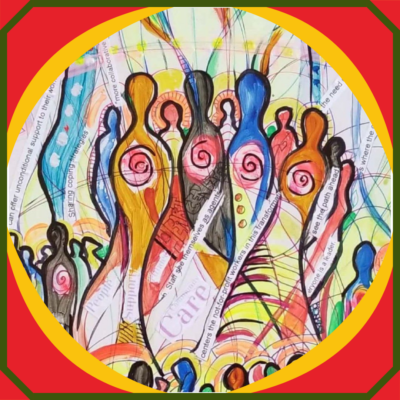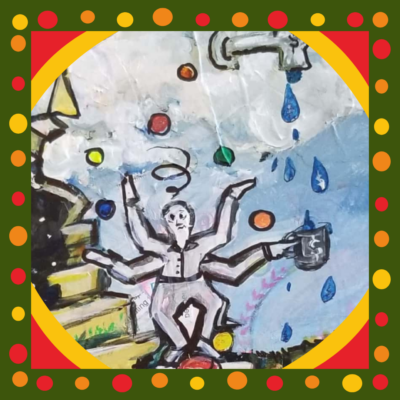Transforming the NPO Sector: Reflection
Rooting in our lived experience, expertise and healing journeys

For Rabindra (alias), this was the first Righting Relations gathering she attended outside of her city. She had no expectations other than to meet a group of Righting Relations members who might be as impacted by the racist, exploitative models of the not-for-profit sector as she has been for the last 12 years. The work of Righting Relations is dynamic and changing, and she has been disconnected from the circle in her city for some time. However, when she received the email with a call out for new members to the Non-Profit Organizations (NPO) Change Lab with experience being organized in unions during the time they work in NPOs, she did not hesitate to put herself and her experience forward to share what she knows and continue learning to support her fellow co-workers and her community.
 She has been in an organization for 20+ years. She has witnessed and experienced the harm of many different leadership and management styles, which are allowed by a model in which leadership accountability to the community and workers is an afterthought. Currently, she feels that her union, which has been her way to protect herself within the organization, is not rising up to the challenge workers are facing. She is witnessing more and more harm and more questionable practices emerge, including inadequate hiring practices. However, Rabindra’s experience is not isolated, and all the stories of executive directors and staff members who came together in this gathering were as difficult and violent as hers.
She has been in an organization for 20+ years. She has witnessed and experienced the harm of many different leadership and management styles, which are allowed by a model in which leadership accountability to the community and workers is an afterthought. Currently, she feels that her union, which has been her way to protect herself within the organization, is not rising up to the challenge workers are facing. She is witnessing more and more harm and more questionable practices emerge, including inadequate hiring practices. However, Rabindra’s experience is not isolated, and all the stories of executive directors and staff members who came together in this gathering were as difficult and violent as hers.
Seven more Righting Relations members, like Rabindra, traveled to Portage la Prairie in Manitoba at the end of August, moved by the call of the NPO change lab and supported by funding from Women and Gender Equality (WAGE). They gathered to continue the transformative work started by the Non-Profit Organizations Transformation Change Lab between 2020 and 2022, a beacon of inspiration in our sector and the introduction to the importance of practical guidelines and tools that support the sector, workers and leadership to understand the manifestations of white supremacy at work, the importance of collective holding and care and the nuanced paths and roads to transformation of the sector by centring in the wellbeing of community members and workers.
At the end of two good working days, we all reaffirmed the healing that comes with telling our stories, with sitting in circle and understanding and defeating the sense of loneliness with the pain created in a line of work that exists to support, uphold and heal others, and our commitment to developing practical tools, and strategies to address the issues that we see with lack of accountability of boards and leaders, the hesitancy to recognize and address lateral violence, the difficulties added by the not applicable model of representations by unions and the need for more supportive models of funding, in which funders put the wellbeing of workers and community at the center.

The path ahead is both long and exciting. We’ve established outcomes and objectives for the next year and a half, all focused on developing practical, applicable resources for people working in the non-profit sector. These resources will help break cycles of loneliness and pain, encourage workers and leaders to reflect on and question their workplace practices, and guide decision-making through informed perspectives.
The group will work on creating two key guides: one for non-profit workers in unionized agencies and another for unions operating within non-profits. We will also gather insights from sector stakeholders to explore supportive and ethical funding processes, developing tools that funders can use to leverage movement on the well-being of workers in organizations.
Additionally, we will focus on internal organizational tools that build confidence in identifying and effectively addressing abuse and lateral violence. This will include examining the roles and accountability of boards and leadership.
This is no small task. We begin by acknowledging the experience and care that brought us together, recognizing that everyone working in this sector deserves a space for healing.
Read the Transforming the Non-Profit Sector report from the first phase of the NPO Change Lab, and download the Addressing Toxicity in Non-Profits Toolkit to learn more about this transformative work.
Publié sous :
adult education, advocacy, anti-oppression, anti-racism, Change Lab, community engagement, decolonization, National, nonprofit, nonprofit solutions, Reflection, Righting relations, social change